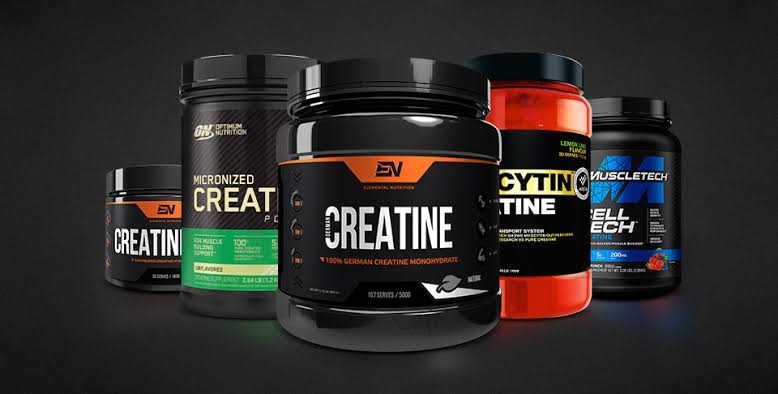
Can Creatine Cause Weight Gain?
If you are a gym bro or sis, then I'm sure you know about creatine. The ultimate muscle builder for optimal athletic performance. It's the supplement on everyone's lips, but despite the benefits, a fear lies underneath.
Can creatine make you fat?
Are the promises of muscle building just a front for its true purpose?
This blog post explores what creatine really does and the role it plays in weight gain.
What is Creatine?
Creatine is a naturally occurring amino acid found inside the muscle cells of humans. This product is responsible for muscle buildup in the arms and legs, plus it also assists in the production of energy.
The human body naturally produces about 1g of creatine daily in the liver, kidney, and pancreas. It can also be gotten from protein-rich foods like red meat, seafood and milk. For people who work out a lot or don't get enough creatine, it is also produced as a supplement.
Usually, it is made as creatine monohydrate, a more dissolvable form that exists as tablets, powders, capsules, or liquids. When you take this, it binds with a phosphate molecule to form phosphocreatine.
This compound produces ATP (energy) for high intensity activity, such as exercise. Thus, it is commonly used by athletes and bodybuilders for muscle buildup and recovery benefits. Majority of the sport supplements provided contain creatine monohydrate.
Many people don't know this, but creatine also plays a major role in cognitive health and brain power. In people 60 and older, it can help with memory loss, mental reasoning and nerve protection.
A study done in 2008 also showed that creatine was useful in regulating blood sugar levels. Those who supplemented their exercise with creatine showed better effects in blood sugar control than just exercise monotherapy.
Can Creatine Cause Weight Gain?
Have you heard others complain about looking fatter and plump after taking creatine? While the main purpose of creatine is to build the muscles and aid energy production, it can also contribute to weight gain through these processes.
1. Water retention:
When creatine is ingested into the body, it acts by drawing water into muscle cells to produce adenosine triphosphate (ATP) and take effect. However, this could lead to water weight, which is also known as fluid retention.
A review published in 2003 established that the gains in body weight are likely due to water retention during the intake of creatine. For most people, this results in bloatedness or puffiness around the arms, legs, and stomach.
2. Increased muscle mass:
Creatine has proven to be an effective supplement to boost strength and endurance, as well as building muscle size. This increase in muscle mass will definitely feel like fat gain, but it is actually just the muscle cells building more energy.
So does creatine cause weight gain? The answer is No. While it might feel like it does because of increased muscle size, creatine doesn't contain any calories so it cannot contribute to fat storage.
How to Take Creatine Without Worrying About Fat Gain
While the creatine supplement does not directly cause weight gain, it is also important to take it as advised to ensure maximal benefits.
• Stay Hydrated:
As creatine works, it draws water into muscles which can make you feel dehydrated over time. So, it is best to drink up to 4 litres of water per day to ensure maximal benefits.
While this might cause your body to look heavier, it is important to remember that it is muscle growth, not actual fat. Also, any water weight you gain will be easily lost through frequent urination.
• Stick to the Recommended Dosage:
According to Dr. Shepherd, physiotherapist at Sheffield Hospital, a dose of 3-5g per day is enough for most people. For best results, it should be split for before and after exercise times.
• Eat a Balanced Diet:
Despite all the amazing benefits of creatine, it can't work alone. Thus, a healthy diet is needed. Not only to promote good health, but to ensure healthy calorie intake. For best results, try to reduce your sodium intake as this compound can cause fluid retention. Eat more fruits and vegetables, and take less carbohydrates as these can cause actual fat to form.
• Exercise Well:
The main purpose of taking creatine is to build muscle mass, but it won't work without exercise. Also, the more you work and train your body, the less water it will retain.
Conclusion
In summary, creatine does not make you fat. It can only increase muscle mass and water retention in muscles, but this does not equate to fat storage.
With proper use, this supplement is an excellent medication for strength, endurance and cognitive health in adults.
But if you're experiencing weight gain from taking creatine, it is likely from improper water retention, diet choices, or your genetic makeup. In that case, make an appointment with a health professional and seek medical advice.
FAQs:
1. Can creatine make you feel bloated and swollen?
No. Bloating is usually caused by water retention under the fatty skin, but creatine only works on the muscles. Thus, you won't look bloated while using creatine.
2. Is creatine only for bodybuilders?
No, anybody can take creatine. Aside from its role in building muscle mass, this supplement also helps with cognitive and nerve health.
3. Will creatine damage the kidney?
Creatine is usually safe for long term use, provided the daily recommended dose is followed properly. However, it should not be combined with any drugs used to treat kidney disease.
Post a comment